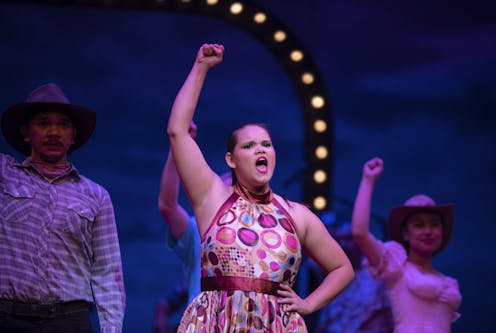A new musical, Panawathi Girl, is a fantasy of Australia's past – and a critique of Australia's present
- Written by Jonathan W. Marshall, Postgraduate Research Coordinator, Western Australian Academy of Performing Arts, Edith Cowan University

Aboriginal and Torres Strait Islander readers are advised this article contains names of people who have died.
Review: Panawathi Girl, written by David Milroy and directed by Eve Grace Mullaley, Perth Festival with Same Drum and Yirra Yaakin Theatre Company.
Viewing David Milroy’s new musical Panawathi Girl, the production is inevitably refracted through the fame of Jimmy Chi’s equally ground-breaking 1990 Perth Festival premiere Bran Nue Dae.
Both are comedic music theatre works authored by First Nations artists from northern Western Australia, set in 1969, and staged with a live, rocking band.
This aside, they are very different.
Bran Nue Dae is a tropical love story which, while alluding to the complex racial divisions and crossings typical of Broome, offers a feelgood portrayal of the protagonist’s sexual and romantic awakening.
In contrast, Panawathi Girl is a buoyant yet cynical depiction of racial conflicts in the Western Australian countryside, self-consciously set in a fantasy of an Australian past: violence free, brightly coloured and populated by surprisingly sympathetic white politicians.
Through this fantasy, however, comes a telling critique of our own times.
The rodeo comes to town
It is 1969. Reformist Labor leader Gough Whitlam (Luke Hewitt) is heading for election against lacklustre Liberal prime minister John Gorton (Geoff Kelso).
As Gorton confides to Whitlam, despite the Labor minister’s support for land-rights, it seems an impossibility to “close the gap” – a clever if depressing reference to the 2008 Closing the Gap agreement and its woeful implementation.
A rodeo has come to the town of Chubb Springs, where the places in which people can drink and live are divided between the “blacks” and “whites”.
Although the 1967 referendum means Aboriginal and Torres Strait Islander people are now formally part of the national population, they are often excluded from voting and other rights.
Read more: ‘Right wrongs, write Yes’: what was the 1967 referendum all about?
Molly Panawathi (Lila McGuire) is the estranged daughter of local white farmer Chubb (Peter Docker). Molly has come to Chubb Springs to learn about her presumed dead mother Pansy (Angelica Lockyer). Having been brought up in Perth away from Country and culture, she is not welcomed by the local Aboriginal community.
Billy (Wimiya Woodley) is sick of the flack he gets from other mob for playing the role of loudmouthed rodeo drunk and has decided he will “head out bush… get my head straight.”
His sister Ada (Teresa Rose) has chosen to keep working for her lanky but intimidating boss Buckley (Maitland Schnaars), who passes as white.
Molly eventually stages a joyous rebellion of sorts at the rodeo ball, complete with a wonderful drag turn by her queer city friend Jojo (Manuao TeAotonga). Like a true panto villain however, Buckley is unrepentant.
“50 years from now,” he explains, leaning comfortably back in his tall frame, “nothing will have changed.”
Idiosyncratic and appealing
The gentle country-and-western twang of pedal steel guitar (played by Lucky Oceans) competes with the more rhythmic strums of conventional guitars (electric and acoustic) to take us from uncertain, yearning songs performed by Molly and others, to party pieces, and other tunes.
There is even a dash of tuba to underpin the sillier moments, some Andrews Sisters-style harmonies with Ava’s slightly awkward turn at the ball, and a particularly demented elegy to a Palomino pony who has become sandwich-meat from Molly’s hippy friend Beth (Grace Chow).
Gorton and Whitlam come together as a recurring double-act, adding political depth and humour to proceedings. Their song and dance routine The Land of the Long White Sock is a particular highlight.
Rodeo broncho buster Knuckles (Gus Noakes) gives some impressive boot scooting in the style of Oklahoma! and Noakes has the finest voice in the cast.
While other actors have beautiful character voices, their vibrato and sustain is not strong. Even in the climactic moments, they don’t belt it out.
But despite this lack of strength, the casts’ voices are idiosyncratic, appealing, and either crack or soar as required, adding to the vaudevillian feel.
Celebration, and critique
Panawathi Girl’s antecedents are at least as much the hilarious but politically pointed vaudevillian Australian music theatre works The Legend of King O’Malley (1970) or Manning Clark’s History of Australia (1988) as they are Bran Nue Dae.
Milroy’s canny political references and criticisms are woven throughout an enjoyably diverse array of styles and references, from Oklahoma! to electrified country, from vaudeville double acts, to wistful solos, set in a kind of Neverland past where everything from the safari suits, to the stripey clothing and Whitlam’s reformist rhetoric, are amplified and celebrated.
But although much of the play feels like a celebration, with an engaging tone and musical appeal, underneath it is truly a critique of how far those dreams have receded in 2022.
As Milroy states in the program, “fifty years on it is difficult to maintain the same optimism.”
Panawathi Girl played as part of the Perth Festival. Season closed.
Authors: Jonathan W. Marshall, Postgraduate Research Coordinator, Western Australian Academy of Performing Arts, Edith Cowan University





